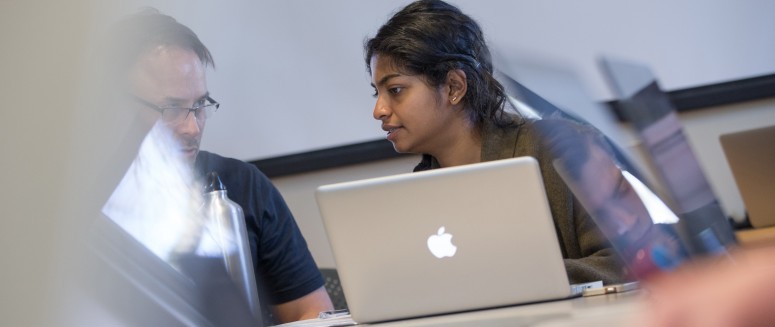Programming Humanity

From Kenyon News - December 12, 2017
When facing a certain collision, could self-driving cars be programmed to choose which lives to save based on a person’s economic productivity? Does Facebook’s algorithm polarize politics by provoking users into angry reactions? These questions and more are explored in “Programming Humanity,” an experimental course on the promise and peril of artificial intelligence.
“Technology has reached a point in our human evolution where it’s impinging upon everything,” said Visiting Instructor of Humanities Jon Chun, a computer scientist and Silicon Valley entrepreneur. “We need to have as many voices at the table as possible in determining these big questions, like what to do about automated killing robots in the field of war and long-term structural unemployment due to technology and automation.”
Chun co-teaches the course with Associate Professor of Comparative Literature and Humanities Katherine Elkins to take a multidisciplinary look at these challenges. “At this point, almost all of the major political and ethical issues confronting us have to do with technology,” Elkins said.
In the early weeks of “Programming Humanity,” students are introduced to basic concepts, like data and algorithms. Later topics build upon this knowledge, with discussions of how to visualize and analyze data, and how algorithms underpin machine-learning and artificial intelligence.
The collaborative and discussion-based nature of the course — drawing 30 students from all class years majoring in a variety of fields — creates an environment in which those majoring in the humanities and in scientific disciplines benefit from each other’s expertise.
“I think it’s really interesting for the humanities students to see the more technical students leading the way on some of these things, and then vice versa,” Elkins said. “It’s really wonderful because there’s respect between groups for the different skills.”
The format of the co-taught course makes full use of both skill sets. In a week focusing on social media, Elkins might lead the class in discussing social and ethical questions surrounding the ubiquity of online social networks. Then, in the lab portion of “Programming Humanity,” Chun takes center stage. As MacBooks are distributed around the room, he leads the students in an exploration of Twitter’s application programming interface. By writing a simple application allowing them to see a real-time stream of all the data flowing through a Twitter feed, the students are able to imagine how to take these technological tools further — for instance, how a motivated programmer might create an army of bots to retweet propaganda.
According to Chun and Elkins, this technological literacy gives students an advantage in the marketplace regardless of which field they choose to pursue. For example, a journalist writing an article about cyber warfare or a policymaker grappling with how to regulate new industries needs to quickly understand highly technical and complex new issues to make informed decisions. “Many companies are competing to have the latest advancements in technology and artificial intelligence, so being an applicant that understands the implications of these advancements in these realms is impressive,” said Hannah Weingold ’18, a psychology major from Jonesboro, Arkansas.
As the students embark on their final projects exploring topics of their choosing — Weingold will create an interactive digital map of artificial intelligence advancements being made around the world — Chun and Elkins intend to leave them more prepared for future opportunities. “Our goal is to produce global citizens who are thinking critically about and trying to solve the major problems of the day,” Elkins said. “It’s not about becoming a good corporate worker, but about actually having the conceptual framework to meaningfully weigh in in society and make a difference.”